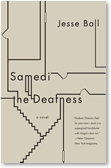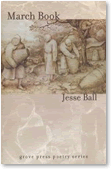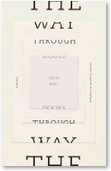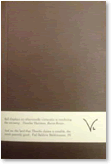Jesse Ball
posted Feb 17, 2009
Jesse Ball is something else. Not just a poet who also writes fiction, but a writer who’s made a name, right out of the blocks, in both genres. His poetry has won admiration from all corners; his novella, The Early Deaths of Lubeck, Brennan, Harp, and Carr, the Plimpton Prize.
For us, his fiction is of particular interest, because he eschews standard narrative to craft texts that are at once fantastic and exhilarating to read. His latest, The Way Through Doors, being a case in point—it’s a roller-coaster ride of a tale, or rather tales, through New York then and now and never-was, underground and over-, and all of it a right-in-close meditation on the storytelling process itself.
And as to how he pulls it all off... well, that’s also something else, as in “entirely.” Read on, to find out just what we mean.
| * * |
You wrote your previous novel, Samedi the Deafness, in three weeks. And we’re told you wrote The Way Through Doors in about two weeks! Was this the time it took to complete a rough draft—or are we reading the first and only draft? If it’s the latter, what role, if any, does revision have in your writing process?
I believe that revision can take place in some sense beforehand by engaging in rigorous reading and thinking practice. Both of the above books are essentially first drafts.
You’re known to sit in silence for three weeks as preparation for starting a novel. During this time, do you work out, in your head, the character and story outlines most writers would put on paper (or on a hard drive)—or are you doing something else?
My time in general is divided into periods of work and periods of fruitful inactivity. During that time, if I have an idea that I would like to later use, I will, of course, write it down. However, I save the real work of writing for periods when I can dedicate an unbroken length of time.
Early on in The Way Through Doors, Rita recalls the death of her cousin and the doctor’s proclamation, “Some people aren’t meant to read.” Who should read the new novel? How do you take the reader into consideration while you write?
I don’t change what I write in order to comfort or discomfit the reader, however, I do go out of my way to be completely sure that all the threads of my books hold together and that everything that is intended is accomplished precisely. The more attention a person pays, the more he/she will find. I believe in trying to create something deeply personal—that someone can receive when he/she reads, an assemblage of things that are kindred both to myself and to my readers. But for me that is an introspective process.
The Way’s narrative is the artifact of a storytelling process—Selah telling stories, without pause, each flowing into the next, to a young woman who’s been hit by a car, in order to keep her awake, and thus alive. As you worked on The Way, did you, in your writing, try to replicate this storytelling process, working without a break, and letting the stories take you wherever they might?
Yes, precisely.
To those of us who’ve read a lot of Russians, Selah’s story about Loren and Ilsa has a familiar ring to it… almost as if Tolstoy’s “How Much Land Does a Man Need?” had met Bulgakov’s Master and Margarita. Which is a roundabout way of asking, Who are your (fiction-writing) influences?
Well, I do love the two you mention. Also: Proust, Walser, Kafka, Conrad, McCarthy, Gogol, Chekhov, Lowry, Borges. Of course—poets too, but that’s not the question.
There are no page numbers in The Way, but there are sentence numbers. Did you consciously seek to make the sentence—rather than the page or chapter—the book’s basic building block? If so, why? And is the integrity and beauty of your sentences more important to you, as a fiction writer, than plot and traditional narrative flow? If so, why?
They are paragraph numbers! I like what Frost says about the sound of sentences, and sometimes a sentence may be a paragraph. But this, the paragraph—it is the onset of speech.
In The Way, Selah’s stories trace a dizzying path that’s at times as hard to follow as the staircase that takes him and his journeymates deep below the surface of Manhattan. Did you worry, as you wrote, that your readers might tire and give up before journey’s end? Did you feel confident that Selah’s inventiveness would be interesting enough to keep them going? Or did you not worry about such things, because you wanted to preserve the integrity of the narrative as it unfolded to you?
I felt confident that as long as I was surprised and fascinated in writing the tale, that it would be worthwhile for others. Also—although it is as you say dizzying, it is not haphazard, so I felt that the reader would be buoyed by assurances that appear at various times.

The Way takes place in a New York that’s at once fantastic and very real—at least, very “realistically” described—and both outside time and, seemingly, in several different times, past and present. Do you mean to make the point that powerful stories can, in indeed should, go beyond traditional realism— or were you just giving free reign, as you wrote, to your own love of the fabulous and anachronistic?
I think realism is a bit silly. It is a formula, an agreed upon one, that says reality is this, or that, or that, but not that. It isn’t any more real than anything else. I don’t mean to criticize at all many of the wonderful storytellers who write in a hyper realistic tradition. People do wonderful work in all genres, all places of making. But for me, I belong to a much older tradition—a tradition of evoking the world as it is in ambiguity and possibility.
Many writers prefer to write always in the same place, indeed in the same room, at the same desk, and so forth… While you’ve written productively in Iceland and Chicago, in a castle, a hotel room, and a coffee shop. Does your environment have an effect on your writing? And when you write, do you find it easy to close yourself off to everything around, and be driven only by what’s inside you? If the latter is the case, do you do anything special to block out the outside world?
If in a place where I don’t speak the language, it is easy to allow external sound to blur into a pleasant haze. In the US and in Iceland I use headphones when I am in public, although I don’t always listen to music. Sometimes I just use them as earplugs.
Did you draw the drawings—or, rather, the drawing—that appear(s) more than once in The Way? Your prose is very effective at conjuring, in your reader’s mind, a vivid picture of the setting and characters you write about—why did you feel the need to include this drawing, rather than describing it?
A difficult question! I wouldn’t say I felt the need to do it. Rather, I thought it would be a delightful gesture.
Our sources swear that The Way was going to be titled, Worlds Fair 7 June 1978—the title of your character Selah Morse’s manuscript. If they’re right, why the change?
The other is too cumbersome on the tongue, too long. It might limit the manner in which people would be capable of recommending the book to others. That said, I like both titles. I have lived with the first for a long time, and still think of it and talk about it with my wife by its initial name.
You’ve been a blackjack dealer, a photographer, a croupier, and spent days hustling old men playing chess. Do any or all of these experiences have an effect on your writing—and if so, how?
Delight!
You’ve produced a tremendous volume of work—poetry and fiction both, published and unpublished. Have you ever gone through a period when you couldn’t write? How do you advise those of your students who might have problems with writer’s block, or find writing slow-going and difficult?
Allow yourself to be surprised. Create routines that manipulate habit and the breaking of habit.
© 2009 failbetter LLC · all rights reserved











